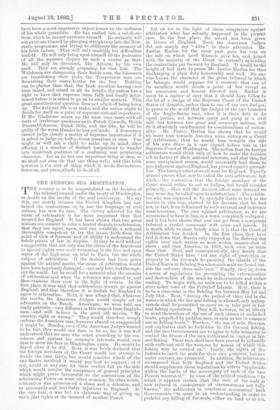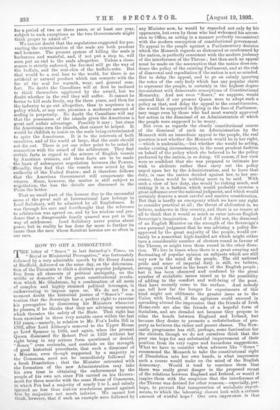THE BEHRING SEA ARBITRATION. T HE country is to be congratulated
on the decision of the tribunal created under the treaty of Washington, to decide on the merits of the seal controversy. We say this, not merely because the United Kingdom has sus- tained its contentions, or, to use the language of civil suitors, has won its case. The victory achieved for the cause of arbitration is far more important than that secured for England. It has been shown that two great nations can consent to refer a heated dispute to arbitration, that they can agree upon, and can establish, a tribunal thoroughly competent to try the issues both from the point of view of fairness and of ability to understand the subtle points of law in dispute. It may be said without exaggeration that not only was the claim of the Americans to special rights over seals swimming in the free and open water of the high-seas, on trial in Paris, but the whole subject of arbitration. If the decision had been given against the natural merits, the cause of arbitration would have been hopelessly damaged,—not only here, but through- out the world. Let us recall for a moment what the enemies of arbitration said when the reference was agreed to, and then examine their view in the light of events. In the first place, it was said that arbitrations always go against England, and that therefore it is foolish for England to agree to arbitration. Next, it was alleged that, whatever the merits, the American Judges would simply act as advocates on the Bench. Americans, we were told, are really patriotic—very different in this respect from English- men—and still believe in the good old maxim, " My country, right or wrong." They would therefore simply endorse the American case, however absurd or exaggerated it might be. Besides, even if the American Judges wanted to be fair, they would not dare to be so, for it was well understood that no man who voted according to his con- science and against his country's interests would ever dare to show his face in Washington again. He would be flayed alive if be did. Next, it was freely declared that the foreign members of the Court would not attempt to decide the case fairly, but would consider which of the two States involved it would pay best to support; or if not, would at any rate let their verdict fall on the side i which would involve the acceptance of general principles which might prove favourable to the contentions of the arbitrating Power on some other occasion. In other words, arbitration was pronounced a sham and a delusion, and as necessarily and inevitably injurious to England. At the very best, it was but an elaborate way of giving up one's just rights at the demand of another Power. Let us see in the light of these complaints against arbitration what has actually happened in the present. case. In the first place, the award has been given in favour of England. Next, the American Judges. did not simply say " ditto " to their advocates. Mr.. Justice Harlan for the most part gave his vote on the side on which Lord Hannen gave his, and joined with the majority of the Court in virtually upholding the contentions put forward by England. It would be the height of bad taste to praise Mr. Justice Harlan for thud, discharging a plain duty honourably and well. No one' who knows the character of the great tribunal to which he belongs, would suppose for a moment that one of its members would decide a point of law except as- his conscience and honour directed him. Rather it must be a matter of envy that it should have fallen to the lot of a Judge of the Supreme Court of the United., States of America, rather than to one of our own Judges:. to prove to the world that the Judges of the two brarieher4. of the Anglo-Saxon race, when it is their duty to de- equal justice, not between party and party in a civil suit, but between two great and sovereign nations, will do it absolutely uninfluenced by considerations of nation- ality. Mr. Justice Harlan has shown that he would no more lean towards America when sitting on a Court of Arbitration, than he would lean towards the side of his own State in a case argued before him in the Supreme Court at Washington. The notion that the foreign arbitrators would think only of how to make the decision tell in favour of their national interests, and that this, for some unexplained reason, would necessarily lead them to give judgment against England, has proved equally ground- less. The foreign arbitrators all went for England. Equally absurd proves what may be called the anti-arbitrators' last ditch,—the contention that the foreign members of the Court would refuse to act as Judges, but would consider' primarily,—How will the decision affect some demand we may some day be called upon to substantiate ? The arbitra- tor who was supposed to be specially liable to look at the. matter in this way, showed by his decision that he had not, in fact, been influenced by such external and improper. considerations. The case against arbitration, as we are accustomed to hear it, has, in a word, completely collapsed ; and it has been shown that you can get from a competent tribunal a verdict consonant with sense and reason.
is worth while to state briefly what it is that the Court of Arbitration has decided, In the first place, they have laid it down that Russia only enjoyed in the Behring Sea rights over such waters as were within cannon-shot of shore ; and that America, in 1868, topic over no more than that. Next, and consequentially, they decide that- the United States have " not any right of protection or property in the fur-seals frequenting the islands of the United States in Behring Sea when such seals are found out- side the ordinary three-mile limit." Finally, they lay down a series of regulations for preventing the extermination and destruction of the seals by indiscriminate and unfair sealing. To begin with, no seals are to be killed within a; sixty miles' zone of the Pribyloff Islands. Next, there is• to be a close-time in the Behring Sea between May 1st and,' July 31st. Next, "during the period of time, and in the' waters in which the fur-seal fishing is allowed, only sailing- vessels shall be permitted to carry on or take part in fur-' seal fishing operations. They will, however, be at liberty' to avail themselves of the use of such canoes or undecked boats, propelled by paddles, oars, or sails as are in common use as fishing-boats." Further, ".the use of nets, firearms, and explosives shall be forbidden in the fur-seal fishing, and the two Governments are to agree to take measures to control the fitness of the men authorised to engage in for sealfishing. These men shall have been proved fit to handle- with sufficient skill the weapons by means of which this fishing may be carried on." Lastly, the rights of the Indians to catch the seals for their own purposes, but not under contract, are preserved. In addition, the arbitrators recommend that both England and the United States, should supplement these regulations by others "applicable. within the limits of the 'sovereignty of each of the two, Powers interested." In view of the critical condition " to which it appears certain that the race of fur-seals is now reduced in consequence of circumstances not fully known," the arbitrators in conclusion recommend both Governments "to come to an understanding in order to prohibit any killing of fur-seals, either on land or at sea, for a period of two or three years, or at least one year, subject to such exceptions as the two Governments might think proper to admit of." We cannot doubt that the regulations suggested for pre- venting the extermination of the seals are both prudent and humane. The present system of killing the seals is barbarous and wasteful, and, if not put a stop to, will soon put an end to the seals altogether. Unless a close- season is strictly enforced, the fur-seal will go the way of the buffalo, and the seal-skin of the buffalo-robe. But that would be a real loss to the world, for there is no artificial or natural product which can compete with the fur of the seal for warmth, wear, and general com- fort. No doubt the Canadians will at first be inclined to think themselves aggrieved by the award, but we doubt whether in the end they will suffer. It cannot be better to kill seals freely, say for three years, and then for the industry to go out altogether, than to acquiesce in a policy which, at any rate, promises a moderate amount of sealing in perpetuity. No doubt the Canadians will say that the possession of the islands gives the Americans a great and unfair advantage. Possibly it may ; but since the Americans own the islands, that cannot be helped. It would be childish to insist on the seals being exterminated to spite the Americans. It is to the interests of both countries, and of the world at large, that the seals should not die out. There is yet one other point to be noted in connection with the award of the arbitrators. They find certain facts in regard to the seizure of English vessels by American cruisers, and these facts are to be made the basis of subsequent negotiation between the Powers. broadly, they find that the vessels were seized by the authority of the United States ; and it therefore follows that the American Government will compensate the owners. Since, however, the matter is still subject to negotiation, the less the details are discussed in the Press the better.
That no small part of the honour due to the successful issue of the great suit at International Law belongs to Lord Salisbury, will be admitted by all Englishmen. It was through his care and forethought that the reference to arbitration was agreed on, and by his wisdom and pru- dence that a disagreeable family quarrel was put in the way of settlement. Lord Salisbury never prates about peace, but in reality he has done far more to further its cause than the men whose flatulent heroics are so often in OUT ears.



































 Previous page
Previous page